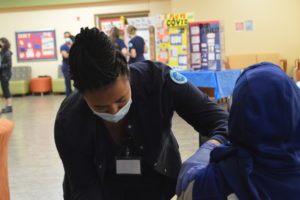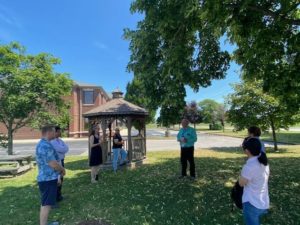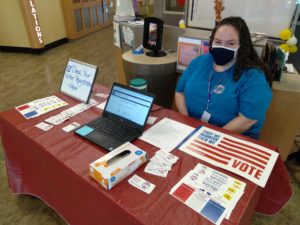Fall 2021

Dr. Lisa Turner taught a Community Health Nursing (NUR 448) class this semester. The students in the class connected with several different local public health sites, from dental sites to elementary health ones. Each site had different projects and demands for pairs of students in the class. The students also each created and presented research projects at a health fair hosted in Alumni Building. Topics ranged from the importance of managing stress and mental health to reproductive health education.
Working directly with the community can also illuminate knowledge from a different perspective than those that are just in the classroom. A student said that “Working with a community partner made me see what types of barriers community members experience that prevent them from getting an optimal healthcare experience.” Another student in the class said, “I was included in conversations at my site that would affect my intended group of focus. I felt like I made an impact.”
______________
Dr. Laura Seroka’s Organizational Communication (COM 302) class worked with the American Association for University Women this semester. Students worked in teams to design a website, build a social media page, and create unique visual media for the organization. It was a venture for the students into digital communication, which is a valuable professional experience. Heidi Stetzer, a student in the class, said “The experiences I’ve had with communicating with our community partner would be hard to replicate in a classroom, and they’ve definitely taught me a lot about what it is to communicate with an entity that’s outside of academia.”
Service-learning classes can provide students with the space to grow and learn professional skills within the safety of a classroom. Heidi continued, “It’s great to see different aspects of professional communication at that level, especially in school where a lot of the work you do is faded by rubrics that let you know exactly what you need to do. But when you’re working with a group outside an academic setting, it’s a lot more fluid.” See the Facebook page created by the class here! https://www.facebook.com/BEREA-American-Association-of-University-Women-100606075750505
Summer 2021

Each summer, CELTS hosts the Service-Learning and Civic Engagement Course Design Seminar for faculty interested in developing a service-learning course or revising an existing course to incorporate civic engagement or service-learning into its design. During the intensive seminar, participating faculty engage in readings and discussions with one another, meet with staff of organizations in the community, and workshop syllabi and assignments together. By the end of the seminar, each participant has designed a project, syllabus, or series of assignments for a course that will be taught in the near future.
Through the Summer 2021 Service-Learning and Civic Engagement Course Design Seminar, five faculty from four different academic disciplines collaborated to learn about how to incorporate Service-Learning into their teaching. Dr. Jianfen Wang said about the experience, “It was eye-opening to learn about the opportunities that service-learning can open for research and scholarship.” She added that working at Berea provides a distinct perspective for implementing Service-Learning into her teaching. As she put it, “service is one the three themes of Berea College’s liberal arts education, so I feel obliged to learn more about integrating learning with working and serving. Berea College’s emphasis on working and serving alongside learning is itself unique and interesting.”
The faculty met with students who had previously taken Service-Learning classes and took a tour to some of the close community partners around the school. This seminar aims to empower and support faculty who are developing Service-Learning classes and those who are looking to focus more of their scholarship on community engagement. The seminar also hopes to connect community-engaged faculty with each other, as well as with community partners! The connections built during the summer seminar continue well beyond the intensive week.
Fall 2020

In the Fall 2020 semester, several classes at Berea College, in collaboration with CELTS and the Service-Learning program, focused on voter empowerment issues surrounding the upcoming election season. Much of the students’ work was done virtually and occurred across multiple disciplines.
Dr. Meta Mendel-Reyes taught Women and African Americans in Politics cross-listed as PSC/AFR/PSJ/WGS 202. The students worked with KFTC (Kentuckians for the Commonwealth), focusing on reaching out to unsure voters who might not have had a plan to vote otherwise. KFTC is a community-based organization working towards a Just Transition and focused on anti-racist work. Students used the EMPOWER app to text voters to encourage them to vote. Many students focused on encouraging people in their personal circles to vote.
A student from the class said, “I loved the relational organizing of it because I wasn’t that uncomfortable reaching out to people that I knew.” Another student observed that one of the most effective methods for encouraging people to vote was to “focus more on telling people about the difference voting has made in the past,” instead of emphasizing guilt or shame.
Dr. Wendy Williams taught Psychology of Women and Gender listed as PSY/WGS 230. Students collaborated with VEPAC, the Voter Empowerment, and Political Awareness Coalition, to boost voter engagement. VEPAC is a coalition among the SGA, CELTS, and Student Life focused on getting students at Berea politically engaged. Throughout the class, students worked online and through postcards sent in the mail to reach out to help voters make plans to vote. Students also created infographics and videos to encourage people to vote.
One student said of the experience, “Although I can’t vote, I have learned many other ways in which I can make my voice be heard while making sure everyone gets to exercise the privilege to vote. I tabled, sent postcards, attended trainings, and researched immense amounts of information. I made sure others knew the importance of their vote while informing myself and making sure my voice was heard, even through others’ votes.”
In reflecting on the collaboration, the class’s Teaching Assistant reported that “the service-learning experience was very well formatted for distance learners and those students that were on campus. I really appreciate that because I was a distance learner, and I never felt as if I was getting less of an opportunity than my peers.”
Laura Seroka also taught COM 100, Intro to Communication, and worked on voter empowerment. Students in Seroka’s class created persuasive videos to encourage eligible undecided voters to vote and shared their materials with VEPAC.
Dr. Seroka and Dr. Williams were also selected as Periclean Voter Empowerment Fellows (PVEF) through Project Pericles, a consortium of 30 colleges and universities that promotes civic engagement within higher education. As PVEFs, they were charged with incorporating nonpartisan voter education into a Fall 2020 course and with connecting with PVEF colleagues from other institutions through a series of virtual gatherings.
Fall 2019
In Fall 2019, students in the Organizational Communication service-learning course taught by Dr. Laura Seroka collaborated with Mountain Association, a community development non-profit based in Berea. The service-learning students supported an audit of the organization’s communication and brand, which resulted in re-branding and new communication strategies for the organization. If you would like more information, please click here.
Dr. Michelle Thornton Adler took on the task of incorporating service-learning in a creative way to work around COVID-19 pandemic safety protocols during the fall 2020 semester. For her HHP 362 course, Teaching and Evaluation in Health and Physical Education, students created videos to encourage fun and engaging activity that involve physical movement. The videos were then sent to her community partner, Ashley Hammond who is the Gear Up College & Career Navigator at Berea Community Elementary School. The partnership was creative and successful, according to Ms. Hammond.
“Service-learning has allowed me to create activities and lessons that are interactive, with the “cool” college kids, and it is a wonderful way to show our young ‘pirates’ higher ed opportunities. The partnership between professor Adler’s students and my elementary students has been invaluable. We have a high percentage of students who are from low socioeconomic backgrounds, kids that are being raised by guardians, and it is important for them to visit college campuses, see college students, and build a mentor-like relationship if possible with them. This year has been unique, and I am impressed with how adaptable our lessons have become. Students are utilizing videos and fun challenges. In the future, I would love to have more interactive lessons and extend this partnership to our middle school students. K-12 students need to see and experience ‘college.’ Watching both the HHP students and the elementary students learn has been amazing. Professor Adler and I both want our kids to grow and learn, and service-learning is the ideal way to accomplish that.”